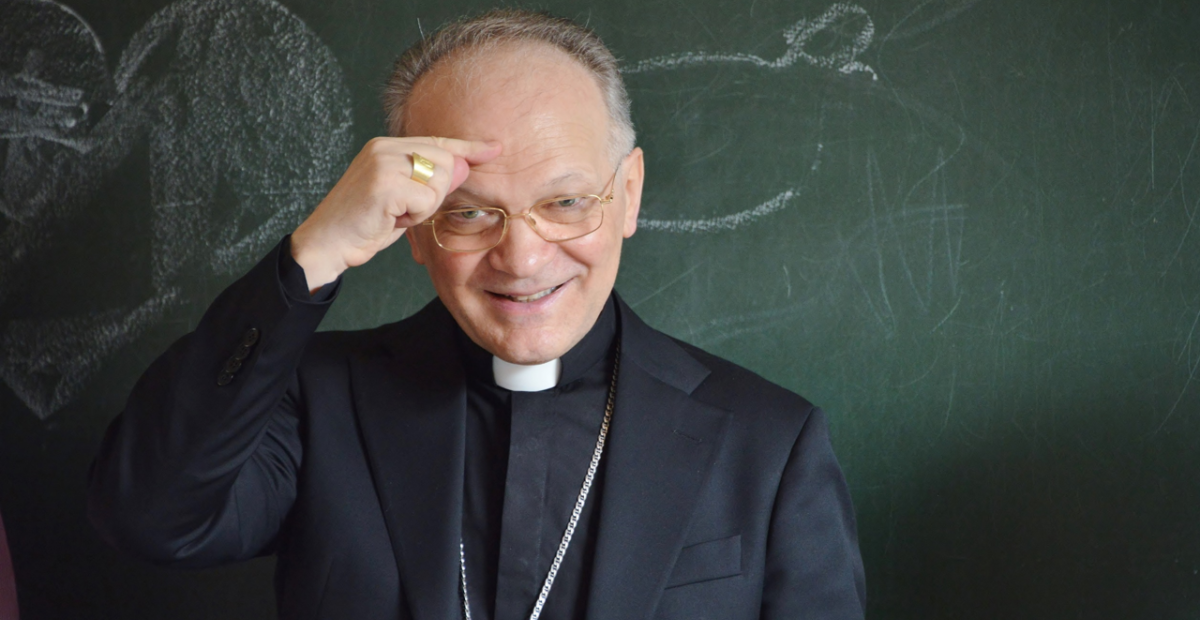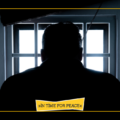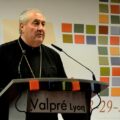
Watch
Peace Education and United World Week: Interview with Archbishop Zani

#InTimeForPeace and United World Week has brought to light stories, experiences, projects, and most of all, people. We opened up a conversation with Archbishop Angelo Vincenzo Zani, since 2012 Secretary of the Congregation for Catholic Education, concerned with education in the widest sense of the word, and promoting the value to the person, to individual talents, to relationships and to the good of a community of being formed in peace-building. We contacted Archbishop Zani in his office in the Vatican, and with a click the dialogue began.
Archbishop Zani, what does working for peace mean from an educational perspective?
A.V. Zani: I think it’s absolutely crucial, because you can’t build peace if you’re not educated in peace and if you don’t educate peace. Because peace is a mature fruit with many aspects to it. It doesn’t come as a spontaneous reaction. Often building peace means first overcoming many difficulties: tensions, problems, diverse positions. So without training, without peace education that involves feelings and thought processes, peace won’t get built. Or it may get built, but on very shaky foundations. There’s no peace without peace education.
Perhaps the secret lies in not giving up the attempt when things get difficult, but to find a way through to overcome the obstacles …
A.V. Zani: The problem is, a lot of the time the idea of peace leads us to think “far away”, to think of who knows what. We may go on peace demonstrations and working for peace can also be a happy lively thing we enjoy. But the true testing ground of peace is actually our daily life! Daily life and our relationships with the people around us, because that’s where we start to encounter differences. We’re brothers and sisters, sons and daughters, parents, we’re all in the same family; but already in the family we can find differences. So the first step is to turn every difference into a springboard, an opportunity to go beyond, to go outside ourselves. That’s where peace begins.
This year’s United World Week has put into sharp focus the fact that young people no longer move in isolation, but rather they’re “young people ‘with’ …”. So, with persons older than them, even very much older, with children of all ages, it’s a people! Would you agree that one way to overcome obstacles is that of giving more value to the relationship between generations?
A.V. Zani: First of all, let me take this opportunity to say I’ve been following some of the United World Week activities directly, and I’d like to say congratulations. Many many thanks. It’s an extraordinary job you’re doing here. There’s a vitality, an enrichment, a world of experiences. On another occasion I said to draw out these stories and give value to them. The world needs to see the light. One of the aspects which has quite rightly been highlighted is overcoming the gap between generations. It’s a fundamental point, often discussed at a scientific level. The difficulty of dialogue, of building solid relationships between generations, between adults and young people, has been identified as one of the greatest difficulties of our time. These studies underline that the biggest crisis lies not in the youth but in the adults! The young people are growing with vitality and a wealth of creativity. Whereas adults enter in crisis over their certainties, over their way of thinking, and having responsibilities in educating and formation, they start questioning the validity of what they’re teaching. A French study defined our current society as an ‘adolescentric’ society, in which it’s the adult who is more likely to experience the adolescent dimension of uncertainty and insecurity, at the same time as the youth is growing up with a great need for models, witnesses and concrete examples to identify with. I’d say this is one of the points where the topic of peace – which basically is built on relationships: there’s no peace where there are no relationships – and education are actively connected.
Young people have a lot to learn from adults, and vice versa. Gone is the season of ‘youthfulness’. We’re now in the season of ‘reality’. As the Pope often repeats, to educate means to guide people by the hand – be they children, young people, but also older people too – to enter within reality. Reality has many dimensions: spiritual, transcendent, concrete, and if you don’t put people within reality, you’ve not achieved your educational goal. The Pope says we must have a cultural revolution within this epochal change. And in this context, I think the United World Week has an important contribution to make.
It’s a change of epoch to make with the head, heart and hands, as Pope Francis always says. In this sense, maybe ‘community’ is the keyword we need to rediscover …
A.V. Zani: I’d say this is fundamental. You can’t educate without a community. You need to educate within and through the community. In this sense, I see that United World Week has a contribution to make towards the Global Educational Pact the Pope is hoping to achieve. I see it in all the experiences you’ve been presenting over these days. You know, when the Pope launched the idea of the Pact, he used an African proverb “to educate, you need a village”, meaning you need a context, an environment, and this underlies the communitarian dimension. But the Pope also says that in the “village of education” we need to learn to scrape off our own particular visions in order to purify them. And finally, to education to go out from the village: you mustn’t remain only within the village confines. The village is a classroom where you learn to go beyond, to face more challenging scenarios.
A final question. The United World Week began life within the Focolare Movement. But almost from the start, it attracted the attention and interest of people outside the Movement. So it’s spreading the good it does beyond …
A.V. Zani: I’m in total agreement with you here. And I’d really like to underline the aspect that’s coming out from this experience: that it’s not only for the Focolare Movement but for everyone. It’s a gift for all of us, and that’s great. My wish is for it to continue more in this direction. Apart from everything else, it’s the Charism of Unity, not just for a few, but for all, even those far from it, those with different religions, from other cultures and social backgrounds. The more we think of going outwards, the more we ourselves must be formed and prepared. And here we come back to the theme of education. As the Pope says, we must have the courage to form people capable of serving the common good. So, the courage to engage in formation, because we get nowhere without formation. Forming people capable of serving everyone. We’ll be able to make contact with those who don’t think like us in as much as we are clear about our positions and we know what we want, what we have to give, and why we serve. Only good quality formation can guarantee this. But it’s a vocation that must be fed by science, discipline, experience and being together.






